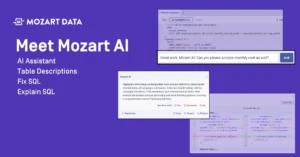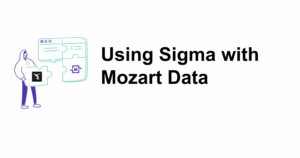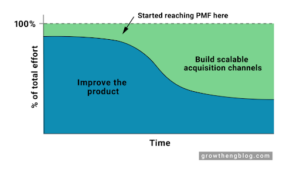TL;DR:
- Marketing agencies are using new technologies to understand consumer preferences and behaviors.
- Without an effective data strategy, agencies struggle with client reporting and internal analytics.
- Data-driven marketing is important for personalized experiences and optimizing performance.
- Integrating data sources and using a modern data platform is crucial for success.
- A data strategy and modern data platform can improve marketing analytics and internal systems.
From social listening to geolocation tools, marketing agencies are using new technologies to understand consumer preferences and behaviors and develop targeted marketing strategies that reach their clients’ desired audience. But even as marketing becomes more data-driven, agencies continue to struggle to produce in-depth client reporting and reliable internal analytics. Without an effective data strategy for marketing agencies, these data-related challenges can hinder their ability to deliver results for their clients and drive their own growth.
Marketing agencies can overcome these challenges by developing an internal data strategy and using it in conjunction with a modern data platform — all without the help of big data companies or data analytics companies. In this article, we’ll outline the steps businesses can take to achieve these outcomes and how they are connected to better client reporting and internal analytics.
The importance of marketing analytics in client reporting
Client reporting is a vital aspect of the agency-client relationship, measuring performance against KPIs and serving as the basis for data-driven decisions about next steps. But for marketers who don’t have strong data practices in place, connecting multiple marketing data sources to track a campaign's success can be a daunting task — and laboriously manual. A client’s contract renewal is contingent on the agency’s performance, and insufficient or underwhelming reporting could put the relationship at risk if clients can’t see the types of marketing data they need to prove ROI.
Why is data-driven marketing important?
With data-driven marketing, companies can achieve objectives, like increasing engagement and conversion rates, through segmentation, personalization, A/B testing, and marketing analytics techniques to optimize performance. Thanks to this level of access to data, marketing has become more one-to-one than one-to-many. Therefore, ads and communications that don’t resonate with consumers will feel impersonal, result in inaction, and make it difficult for consumers to develop loyalty for a brand that doesn’t show they understand them. Simply put, mass marketing is now a waste of resources and budget due to the accessibility of tools that support a data-driven marketing strategy and produce results.
Marketing data examples
Although a marketing agency may have the tools it needs to create a data-driven marketing campaign, it can still fail to deliver a strong client report. This would inevitably cause the client to lose confidence, as the report reflects the strength of the campaign and the agency's capabilities. Let’s see what an example of this might look like.
Little Blue Dragon (LBD) marketing agency has a client that is a U.S. nationwide car rental company, called Simply Cars. During onboarding, LBD’s team collaborated with the marketing leads at Simply Cars to develop a data-driven marketing strategy to create personalized experiences, increase customer retention, and drive brand loyalty. The strategy has LBD’s team analyzing customer data from multiple channels to identify preferences and behaviors by audience segment, such as business versus leisure travelers. The insights gained from segmentation and analysis will enable LBD’s marketing agency to create data-driven campaigns that include real-time targeted email sends and push notifications with personalized offers. Additionally, digital components like social media and display ads will engage consumers in other channels.
LBD is running campaigns through Meta, Google, and Simply Cars’ marketing automation platform, among other tools. These disparate data sources must be integrated for LBD to understand how engagement and conversion rates might be connected among touchpoints. For example, to answer questions such as, “Is Facebook over-attributing conversions?” and “How do conversion rates differ among leisure travelers who were part of a display ad and email campaign versus the control group?”
The ability to answer these questions hinges on what technology you have behind the scenes. Without a data strategy and modern data platform, you’ll struggle to connect your data sources to the point where you can't answer detailed questions or even show success. Manually exporting reports and trying to integrate them in a spreadsheet for every client isn’t a scalable solution.
Data for Marketing Analytics
This is where a data strategy and a modern data platform can set up your agency for success. A data strategy involves identifying the organization’s data needs, data sources, and how the data will be used. By implementing a data strategy, marketing agencies can be confident that they are collecting the right data, keeping it well-organized, and putting it to work for them.
A modern data platform is the workhorse behind the data strategy. It consists of an ETL (extract, transform, load) tool, a data warehouse, and a data transformation layer. An ETL tool does automated data work in three parts. First, it extracts data from each source platform. Then, it transforms or cleans the data to rid it of flaws, like duplicate values or improperly formatted values. Finally, it loads the data sets into a data warehouse, where the information is organized and centrally stored for access by those who need it. When it’s time for client reporting or to analyze channel performance for optimization, the data warehouse can be queried for the information needed, and the data transformation layer will prepare it before it’s sent downstream, such as to a business intelligence tool or Google Sheets. Ideally, you’d also use a business intelligence tool to analyze data and create visualizations, but spreadsheets can work, too, if your budget doesn’t allow for a more specialized tool.
Data for Internal Analytics
How effective is your marketing agency at reconciling payments and measuring performance against KPIs, such as client retention rate, client acquisition cost, and utilization rate? If your data pipeline lacks transparency, you may be unable to complete these internal tasks effectively. A data strategy and modern data platform also help marketing agencies stay on top of their finances and make informed decisions about where to allocate resources and optimize workflows.
When you consider the question of whether clients are paying the correct amount and doing so on time, it’s surprisingly hard to answer with just billing software or a CRM like Salesforce. But with the data from all your tools flowing into a single data warehouse, it’s easy to pull the information you need and get answers when you need them.
One especially useful tool that Mozart’s modern data platform offers is the ability to raise alerts once predefined rules are met. These proactive, automated alerts can flag events and conditions, like irregularities, such as in payments; milestones, such as billable hours for a particular client; and long-term trends, like a sustained client retention rate.
Setting up a Modern Data Platform
You don’t need to be a data science company to act like one. A data strategy and modern data platform can help marketing agencies improve their analytics, stay competitive, and gain better insight into their business. Mozart’s out-of-the-box modern data platform has all the tools you’ll need to get started, including Fivetran, which supports 400+ data connectors and automates ETL; a Snowflake data warehouse; and a data transformation layer built on a SQL editor. Importantly, it can be set up quickly and without high technical expertise, so you can start improving your internal systems and marketing analytics process faster. See how easy Mozart makes it to bring your data strategy to life by scheduling a demo.


